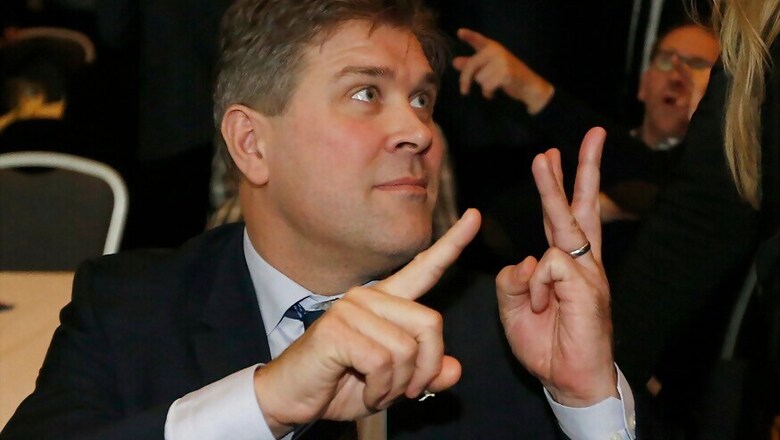
views
Reykjavik: Iceland votes in a second snap election in just a year on Saturday as several scandals have caused a distrust in the political elite despite a thriving economy triggered by booming tourism.
Prime Minister Bjarni Benediktsson of the conservative Independence Party called the vote last month after a junior member of the three-party centre-right coalition quit the government over a legal scandal involving his father.
Saturday's election is Iceland's fourth since 2008. Polls published Friday by public broadcaster RUV and the daily Morgunbladid show that the Independence Party could get 17 seats in the 63-seat parliament, the Althingi.
The main rival Left-Green Movement and its potential partners -- the Social Democratic Alliance and the anti establishment Pirate Party -- would together win 29 seats, too short of a 32-seat outright majority.
But with help from a fourth party, they could dethrone the centre-right and become Iceland's second left-leaning government since its independence from Denmark in 1944.
"If these are the election results, it's a call for the opposition to form a government," Left-Green leader Katrin Jakobsdottir, 41, told Morgunbladid.
But the Independence could also partner with their former ally the Progressives, which would win between five to six seats, the Center Party (six seats) and the liberal Reform party (five seats).
"These numbers tell me that we need a boost," Benediktsson, 47, told Morgunbladid.
Polls open at 0900 GMT and close at around 2200 GMT.
Under the Icelandic system, the president, who holds a largely ceremonial role, then tasks the leader of the biggest party with trying to form a government.
"The fear is whether there will be a possibility to form a government," Arnar Thor Jonsson, a law professor at Reykjavik University, told AFP, recalling that negotiations to form a coalition after the October 2016 election took three months.
Since the 2008 financial crisis, when Iceland's three major banks collapsed and the country teetered on the verge of bankruptcy, it has made a spectacular recovery with robust growth of 7.2 percent in 2016 and unemployment at an enviable 2.5 percent.
But anger and lack of trust in the financial elite and several politicians, who were implicated in the Panama Papers that revealed a global tax evasion, has shaken up politics in the island nation.
'It's the economy, stupid!'
A year ago, snap elections were called after then-prime minister Sigmundur David Gunnlaugsson was pressured to resign when he was named in the so-called Panama Papers tax data leak which exposed offshore tax havens.
More than 600 Icelanders -- a surprisingly high number in a country of 335,000 -- were also named in the documents, including Benediktsson, the then finance minister.
Despite that, Benediktsson was able to build a coalition with the centrist Bright Future and centre-right Reform Party, holding a one-seat majority in parliament before becoming the shortest-lived government in Iceland's history.
Hannes Gissurarson, a political science professor at the University of Iceland, said the reason behind the Independence's resurrection can be attributed to the famous phrase of Bill Clinton's chief strategist James Carville: "It's the economy, stupid!"
Construction is booming: cranes cover the skies in Reykjavik's city centre, away from Iceland's breathtaking volcanoes and glaciers.
Independence supporters still view the party as the main force for economic stability and growth. Nearly half of the postwar prime ministers came from the eurosceptic party.
The Independence and the Progressive party ended Iceland's EU membership bid in 2015 over a mackerel war with Brussels.
Eva Sveinsdottir, a 33-year-old conservative voter, said the former centre-right government's decision to end the talks "saved Iceland after the 2008 crisis".
"We are in a much better situation than Greece," she said.
"If we were a member they would take the fishing areas from us."
'Rich parents'
Other voters are ready for change and are drawn to the Left-Green Movement which calls for investments in social welfare, affordable housing and tax hikes for the wealthiest.
Iceland's thriving tourism scene has caused an increase in housing prices and a shortage in available apartments, many of which are rented out to tourists.
According to Iceland's Housing Financing Fund, rent has risen by 13.9 percent between September 2016 and September 2017 in Reykjavik.
"Young people can't find housing because it's too expensive," Jarya Sukuay, a 23-year-old voter in Reykjavik, told AFP.
"I work in an ordinary store and my income is not enough to make ends meet," she added.
"The people in the government do not understand (working people) because they all have rich parents."

















Comments
0 comment